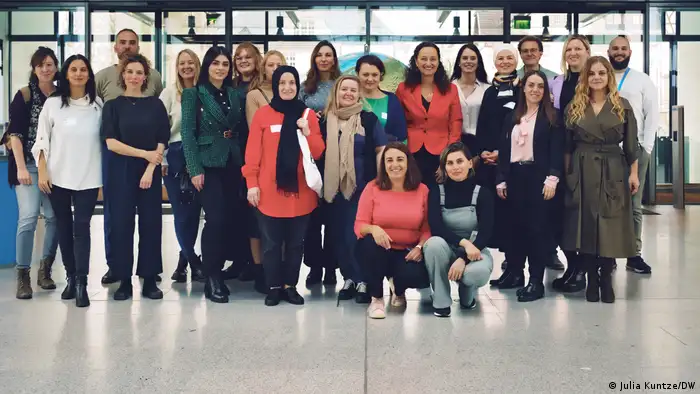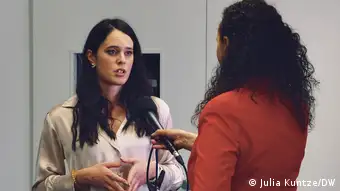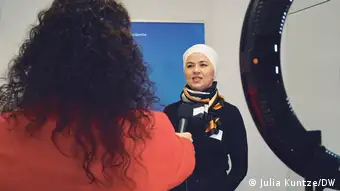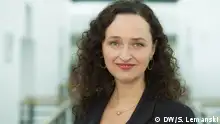Training
Women and religion: "For a long time, I thought I wasn’t leadership material"
Women representatives from different religions met at DW Akademie for a special one-week communication workshop. Together they worked on messages to promote interfaith dialog.
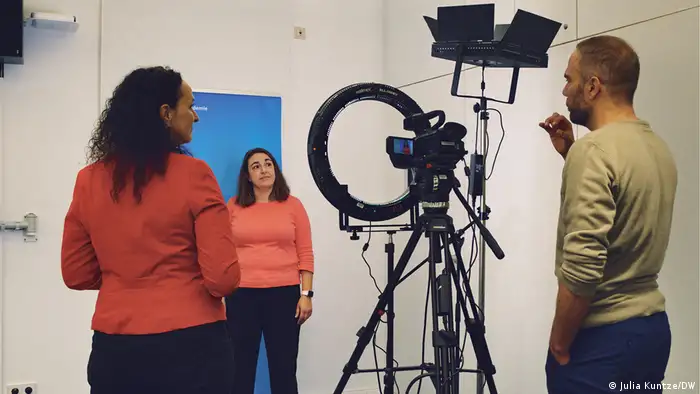
Melanie Ivančević (center), participant in the DW Akademie communication workshop "Religion and Media" during the statement training in front of the camera with Daniela Wiesler (left) and Patrick Batarilo (right)
It was Monday morning in Bonn and 13 international religious representatives had come together for the first time. Each had filmed a short introductory video of herself before leaving her country, and as they watched their videos together, delved straight into the topic. "I felt unsure because I don’t feel comfortable on-camera," said one participant assessing her own video.
"Had any of you noticed that?" asked Daniela Wiesler, Head of DW Akademie's Media Training division. None of the other participants had.
Peace processes more sustainable when women are involved
During the one-week communications course, conducted by DW Akademie and financed by Germany’s Federal Foreign Office, the women took a closer look at how they see themselves as well as how others perceive them. They also learned how to come across more professionally on-camera and to confidently spread their core message: that religious communities can live peacefully together. They were from eleven Southeast and Eastern European countries, including Bosnia and Herzegovina, Montenegro, Ukraine and Turkey, and whether from the Muslim, Jewish or Christian faith, they all play significant roles within their own communities.
"International studies show that peace processes are far more successful and sustainable if women take part but that they’re usually excluded from negotiations or don't have an official role to play. They simply aren’t heard," said Wiesler explaining the background to the course.
"We strengthen participants in their roles as well as their communication skills so that they become visible and are listened to and can support each other in future networks," she continued. "They potentially have so much power to de-escalate crises and in peacemaking processes both here in Europe and elsewhere in the world, and to keep channels open for an interfaith dialog. This workshop gives them the skills to do this even more so and to bring it into the public sphere."
Confident in controversial discussions
"I thought we’d be different from each other," said Ivana Mitrović, PR manager for the Jewish Community in Montenegro. "Religion is such a sensitive topic – it's an emotion and it’s all-encompassing. Nevertheless, we have so much in common – our thoughts, fears and challenges."
Their shared challenges include shaping their religious communities. Melanie Ivančević, an Evangelical Lutheran pastor in Croatia and president of the Ecumenical Women's Initiative said: "For a long time, I thought I wasn’t leadership material. I don't have the qualities we usually associate with leadership and which are stereotypically male: competitive, strong-willed, aggressive and ready for conflict." She said her goal at the workshop was to learn to be herself and to come across more confidently during controversial discussions.
She knew these often involve tolerance and its limits. "I have to be emotionally strong to hold these talks," she said, and not just for herself but for her parishioners who support, for example, the rights of the LGBTQI+ community.
Responsible communication for social cohesion
The course participants work in different areas that range from PR and communication to youth work and education but where interfaith dialog always plays a role. Dževada Šuško from Sarajevo heads the office for international cooperation which is part of the foreign affairs department for the Muslim community in Bosnia and Herzegovina. She said communicating responsibly is essential. "If we can talk about what we have in common, like our challenges, identities and even aspects of our religions, we can work towards social cohesion and resilience," she said.
Still, as Šuško looked around the room she stressed another major challenge: "Although you can find highly intelligent women holding various positions you unfortunately won't find them at levels where decisions are being made."
Pastor Ivančević, however, remained optimistic: "I firmly believe that change comes from the ground up. It takes time for change to reach the top."
In the "Religion and Media – Conflicts in Europe. Seeking and maintaining dialogue in challenging times" media training course, religious representatives from Southeast and Eastern Europe worked together on messages promoting interfaith dialog. The week-long program included workshops on constructive journalism and fact-checking, discussions on the role of religions in the media and on female leadership, as well as on-camera and social media training.
The program was part of a collaboration with the German Federal Foreign Office which since 2016 has promoted interfaith exchange with conferences and workshops under the title "Responsibility of Religions for Peace."
DW recommends
Audios and videos on the topic
- Date 08.12.2023
- Author Eva-Maria Senftleben
- Feedback: Send us your feedback.
- Print Print this page
- Permalink https://p.dw.com/p/4ZsuK
- Date 08.12.2023
- Author Eva-Maria Senftleben
- Send us your feedback.
- Print Print this page
- Permalink https://p.dw.com/p/4ZsuK

